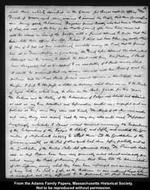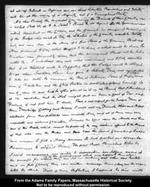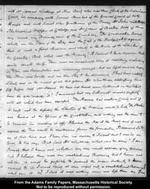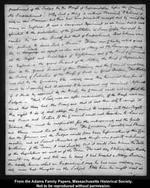made them entirely dependent on the Crown for Bread [as ]well as office. The Friends of Government were anxious to perswade the People, that their Commissions were during good Behaviour. Brigadier General Brattle, who had been a Practioner of Law, and was at this time in his Majestys Council, after some time, came out with his name in one of the Gazettes, with a formal Attempt to prove that the judges held their offices for Life. Perhaps I should not have taken any public Notice of this, if it had not been industriously circulated among the People, that the General had at a Town Meeting in Cambridge the Week before advanced this doctrine And challenged me by name, to dispute the point with him. His Challenge I should have disregarded, but as his Appeal to me was public, if I should remain silent it would be presumed that my Opinion coincided with his. It was of great Importance that the People should form a correct Opinion on this Subject: and therefore I sent to the press a Letter in Answer, which drew me on to the Number of Eight Letters, which may be seen in the Boston Gazette for this Year. The Doctrine and the History of the Independence of judges was detailed and explained as well as my time, Avocations and Information enabled me: imperfect and unpollished as they were they were well timed. The Minds of all Men were awake and every thing was eagerly read by every one, who could read. These papers Accordingly, contributed to spread correct Opinions concerning the Importance of the Independence of the judges to Liberty and Safety, and enabled the Convention of Massachusetts in 1779 to adopt them into the Constitution of the Commonwealth, as the State of New York had done before, partially, and as the Constitution of the United States did afterwards [in] 1787. The Principles develloped in these Papers have been very generally, indeed almost universally prevalent among the People of America, from that time, till the Administration of Mr. Jefferson, during which they have been infringed and are now in danger of being lost. In such a Case, as the Ballance in our national Legislature is imperfect and very difficult to be preserved, We shall have no ballance
at all of Interests or Passions, and our Lives, Liberties, Reputations and Estates will lie at the mercy of a Majority, and of a tryumphant Party.
at all of Interests or Passions, and our Lives, Liberties, Reputations and Estates will lie at the mercy of a Majority, and of a tryumphant Party.
At this Period, the Universal Cry, among the Friends of their Country was "What shall We do to be saved?" It was by all Agreed, As the Governor was entirely dependent on the Crown, and the Council in danger of becoming so if the judges were made so too, the Liberties of the Country would be totally lost, and every Man at the Mercy of a few Slaves of the Governor. But no Man presumed to say what ought to be done, or what could be done. Intimations were frequently given, that this Arrangement should not be submitted to. -- I understood very well what was meant, and I fully expected that if no Expedient could be suggested, that the judges would be obliged to go where Secretary Oliver had gone to Liberty Tree, and compelled to take an Oath to renounce the Royal Salaries. Some of these Judges were men of Resolution and the Chief Justice in particular, piqued himself so much upon it and had so often gloried in it on the Bench, that I shuddered at the expectation that the Mob might put on him a Coat of Tar and Feathers, if not put him to death. I had a real respect for the judges. Three of them Trowbridge, Cushing and Brown I could call my Friends. Oliver and Ropes abstracted from their politicks were amiable Men, and all of them were very respectable and virtuous Characters. I dreaded the Effect upon the Morals and temper of the People, which must be produced, by any violence offered to the Persons of those who wore the Robes and [illegible] bore the sacred Characters of judges, and moreover I felt a strong Aversion to such partial and irregular Recurrences to original Power. The poor People themselves who by secret manoeuvres are excited to insurrection are seldom aware of the purposes for which they are set in motion: or of the Consequences which may happen to themselves: and when once heated and in full Career, they can neither manage themselves, nor be regulated by others. Full of these Reflections, I happened to dine with
with Mr. Samuel Winthrop at New Bost [Boston], who was then Clerk of the Superiour Court, in company with several Members of the General Court of both Houses and with several other Gentlemen of the Town.Dr. John Winthrop Phylosophical Professor at Colledge and Dr. Cooper of Boston both of them very much my Friends, were of the Company. The Conversation turned wholly on the Topic of the Day -- the Case of the Judges. All agreed that it was a fatal Measure and would be the Ruin of the Liberties of the Country: But what was the Remedy? It seemed to be a measure that would execute itself. There was no imaginable Way of resisting or eluding it. There was lamentation and mourning enough: but no light and no hope. The Storm was terrible and no blue Sky to be discovered. I had been entirely silent, and in the midst of all this gloom, Dr. Winthrop, addressing himself to me, said Mr. Adams We have not heard your Sentiments on this Subject, how do you consider it? I answered that my Sentiments accorded perfectly with all which had been expressed. The Measure had created a Crisis, and if it could not be defeated, the Liberties of the Province would be lost. The Stroke was levelled at the Essence of the Constitution, and nothing was too dear to be hazarded in warding it off. It levelled the Axe at the Root, and if not opposed the Tree would be overthrown from the foundation. It appeared so to me at that time and I have seen no reason, to suspect that I was in an Error, to this day. But said Dr. Winthrop, What can be done? I answered, that I knew not whether any one would approve of my Opinion but I believed there was one constitutional Resource, but I knew not whether it would be possible to persuade the proper Authority to have recourse to it. Several Voices at once cryed out, a constitutional Resource! what can it be? I said it was nothing more nor less than an Im
peachment of the Judges by the House of Representatives before the Council. An Impeachment! Why such a thing is without Precedent. I believed it was, in this Province: but there had been precedents enough, and by much too many in England: It was a dangerous Experiment at all times: but it was essential to the preservation of the Constitution in some Cases, that could be reached by no other Power, but that of Impeachment. But whence can We pretend to derive such a Power? From our Charter, which gives Us, in Language Words as express, as clear and as strong as the Language affords, all the Rights and Priviledges of Englishmen: and if the House of Commons in England is the grand Inquest of the Nation, the House of Representatives is the Grand Inquest of this Province, and the Council must have the Powers of Judicature of the House of Lords in Great Britain. This Doctrine was said by the Company to be wholly new. They knew not how far it could be supported, but it deserved to be considered and examined. After all if it should be approved by the House, the Council would not convict the judges. -- That, I said, was an after consideration, if the House was convinced that they had the Power, and that it was their duty to exercise it, they ought to do it, and oblige the Council to enquire into their Rights and Powers and Duties. If the Council would not hearken to Law or Evidence, they must be responsible for the consequences, and the Guilt and blame must lie at their door. The Company seperated, and I knew that the Governor and the judges would soon have Information of this Conversation, and as several Members of both Houses were present, and several Gentlemen of the Town, I was sensible that it would soon become the Talk of the Legislatures as well as of the Town. The next day, I believe, Major Hawley came to my House and told me, he heard I had broached a strange Doctrine. He hardly knew what an Impeachment was, he had never read any one and never had thought on the Subject. I told him he might read as
with Mr. Samuel Winthrop at New Bost [Boston], who was then Clerk of the Superiour Court, in company with several Members of the General Court of both Houses and with several other Gentlemen of the Town.Dr. John Winthrop Phylosophical Professor at Colledge and Dr. Cooper of Boston both of them very much my Friends, were of the Company. The Conversation turned wholly on the Topic of the Day -- the Case of the Judges. All agreed that it was a fatal Measure and would be the Ruin of the Liberties of the Country: But what was the Remedy? It seemed to be a measure that would execute itself. There was no imaginable Way of resisting or eluding it. There was lamentation and mourning enough: but no light and no hope. The Storm was terrible and no blue Sky to be discovered. I had been entirely silent, and in the midst of all this gloom, Dr. Winthrop, addressing himself to me, said Mr. Adams We have not heard your Sentiments on this Subject, how do you consider it? I answered that my Sentiments accorded perfectly with all which had been expressed. The Measure had created a Crisis, and if it could not be defeated, the Liberties of the Province would be lost. The Stroke was levelled at the Essence of the Constitution, and nothing was too dear to be hazarded in warding it off. It levelled the Axe at the Root, and if not opposed the Tree would be overthrown from the foundation. It appeared so to me at that time and I have seen no reason, to suspect that I was in an Error, to this day. But said Dr. Winthrop, What can be done? I answered, that I knew not whether any one would approve of my Opinion but I believed there was one constitutional Resource, but I knew not whether it would be possible to persuade the proper Authority to have recourse to it. Several Voices at once cryed out, a constitutional Resource! what can it be? I said it was nothing more nor less than an Im
peachment of the Judges by the House of Representatives before the Council. An Impeachment! Why such a thing is without Precedent. I believed it was, in this Province: but there had been precedents enough, and by much too many in England: It was a dangerous Experiment at all times: but it was essential to the preservation of the Constitution in some Cases, that could be reached by no other Power, but that of Impeachment. But whence can We pretend to derive such a Power? From our Charter, which gives Us, in Language Words as express, as clear and as strong as the Language affords, all the Rights and Priviledges of Englishmen: and if the House of Commons in England is the grand Inquest of the Nation, the House of Representatives is the Grand Inquest of this Province, and the Council must have the Powers of Judicature of the House of Lords in Great Britain. This Doctrine was said by the Company to be wholly new. They knew not how far it could be supported, but it deserved to be considered and examined. After all if it should be approved by the House, the Council would not convict the judges. -- That, I said, was an after consideration, if the House was convinced that they had the Power, and that it was their duty to exercise it, they ought to do it, and oblige the Council to enquire into their Rights and Powers and Duties. If the Council would not hearken to Law or Evidence, they must be responsible for the consequences, and the Guilt and blame must lie at their door. The Company seperated, and I knew that the Governor and the judges would soon have Information of this Conversation, and as several Members of both Houses were present, and several Gentlemen of the Town, I was sensible that it would soon become the Talk of the Legislatures as well as of the Town. The next day, I believe, Major Hawley came to my House and told me, he heard I had broached a strange Doctrine. He hardly knew what an Impeachment was, he had never read any one and never had thought on the Subject. I told him he might read as




